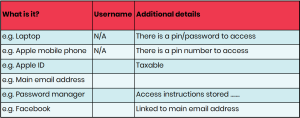Passing down digital assets
With so many aspects of our lives now managed online, it is becoming increasingly important to consider how digital assets will be dealt with on a person’s death, as well as their physical assets.
Developments in technology are fast paced, Hotmail was launched in the late 1990s, the iPhone first appeared in 2007, and Facebook announced they had 1 billion monthly active users by 2012. Today, there are around 4 million apps available across Apple and Android platforms and the average person has 40 apps installed on their smartphone. It is therefore highly likely that most estates will now include some form of digital assets.
Executors need to consider digital assets when administering an estate, but there are also actions that can be taken ahead of time to make their job a little easier.

7th May 2025
-
Nicola Allen See profile
What is a digital asset?
The first thing that many people will think of when they hear the term ‘digital asset’ is cryptocurrency, but they are much more than that.
Not all digital assets will have a value, but they do all need dealing with.
A digital asset is something that exists solely in the non-binary space, a digital record, traditionally stored digitally on a hard drive or digital platform. It can be broken down into a number of different headings:
- Hardware – i.e. devices – computers/tablets, smartphones, smartwatches etc.
- Smart home devices – Google home, Alexa etc.
- External storage – USB sticks, external hard drives, SD cards etc.
- Cloud storage – OneDrive, Dropbox etc.
- Software – apps, games, Microsoft Windows, Anti-virus and other subscriptions
- Password vault/manager
- Email accounts
- Messaging accounts – WhatsApp etc.
- Social media platforms – Facebook, LinkedIn etc.
- Photo and video storage/platforms – iCloud, Flickr
- Video and blog platforms – YouTube
- Streaming services – Netflix, Disney Plus, Amazon Prime
- Ecommerce – eBay, Amazon Marketplace
- Gambling and gaming accounts – National lottery, betting accounts
- Mobile payment service and applications – PayPal, Apple pay, Google pay
- Financial accounts – banks, investments, cryptocurrency
- Digital travel – Oyster card, train tickets, Expedia account
- Documents – PDFs, Word documents, spreadsheets
Why is it important?
Executors are responsible for administering the estate and ensuring that it is managed and distributed in accordance with the Will, and this includes the ‘digital estate’.
Digital assets also mean digital property rights and interests. They may have a physical or only sentimental value. These assets can be specifically given in a Will, as a lifetime gift, or settled on trust.
It can include digital tokens like cryptocurrency and also gaming tokens or virtual points that are transferable.
It is important to make sure that digital assets are dealt with and are not just left open, as this increases the risk of abuse of the information/accounts by scammers, for example through identity theft.
If there are significant digital assets in a person’s estate, and they are happy that the executors they have chosen would be able to deal with all other aspects of their estate, but they don’t feel they would have the capabilities to deal with these, their Will can include power to allow this to be delegated to a ‘digital manager’. This would enable someone with more experience and expertise to assist with this area.
Practical steps and recording information
It is important that we all understand our digital footprint. We should consider what hardware/devices we have and how we use them. This can help us to identify how our digital estate is made up.
People often think about tidying up aspects of their estate to help to make things as straightforward as possible for their executors, for example consolidating bank accounts, simplifying and sorting financial and physical assets. This could also be applied to digital assets, for example closing down online accounts and apps that are no longer used.
It may be helpful to compile a basic table to record information of hardware and online accounts. This should not include password information.

As with physical possessions, thought can be given to what should happen to digital assets after death. For example, who should have copies of digital photos, or what should happen to social media accounts.
This can be recorded on a memorandum of wishes kept with the Will, as is often the case for physical chattels.
For social media accounts, it can be possible to put a legacy contact in place during lifetime and there may be several choices as to what can happen with the account – it can die with you, continue to be managed after death (with some limitations), or frozen in time.
In dealing with digital assets, Executors will need to follow the same process as they would with the rest of the estate, but accessing the information can be a hurdle.
It is important to consider how Executors will be able to access accounts after someone has passed away:
- Do they know how to access the hardware/device?
- Is there two-factor authentication and do they have access to all devices to deal with this?
- Do they know how accounts are linked – e.g. if linked to an email address, which one and will they be able to access emails?
With regards to password security, it is obviously important not to share passwords with other people! It is recommended to use a password manager/vault to store passwords and log in information, but someone should know how to access this or ensure that details of how to access it are safely held somewhere.
As we would recommend with all matters of estate planning, the best thing to do is to start thinking about your digital assets now, what your wishes are and whether you need to take any action and having open conversations with family and friends.
We’re here to help
If you have any questions, or want to discuss your individual circumstances with an Old Mill financial expert, please do get in touch by clicking here…

